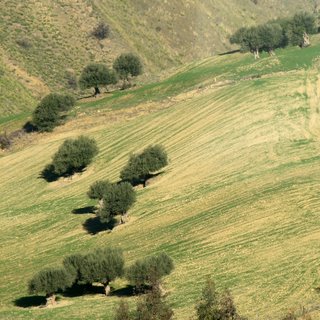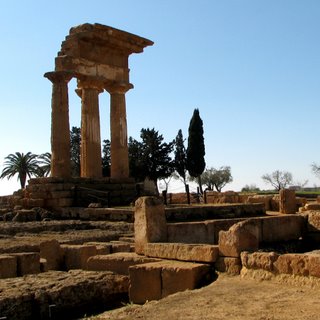
Just to review, Sicily (Sicilia) is the island about to get punted by Italy's boot. It sits in the Mediterranean, surrounded by blue ocean and blue sky, under a glowing blanket of sun. The soil is more orange than brown and spills out in craggy rocks and under large cactus groupings.
The benefit of taking a two-hour train ride across the island is the striking terrain streaming past the window. We were headed south from Palermo to Agrigento to visit the Valley of the Temples (Valle dei Templi) and although it was an early morning train - and it was a Sunday - we stayed up to watch the show. Our train started along the sea, paralleling stone beaches and deep blue waters. And then the train turned inward and crossed the island.

The land was gorgeous and raw, with the tough glow of something baking in the sun for ages. There are rough reaching hills and miles of flatlands pooling at their bases. Orange and lemon trees. Yellow grasses rolling down embankments. Patches of yellow soil tiger-striping the land where vegetation hasn't taken hold. Single trees, and their shadows, spotting isolated stretches. One ruined stone cottage in 5 miles of lonely land.
It was a very different view than we're used to seeing and we thoroughly enjoyed it. That's the wonder of Europe's trains - not only do you get where you're going, generally economically and on time - but you also get to see what passes along the way.

We landed at the Agrigento train station and began the always amusing process of figuring out how to reach our true destination. After a 7 euro map (unnecessary), several free maps (slightly more necessary), 2 coffees (not the way we like them), a run to catch the bus (successful), a bus ride (also successful), and a dusty walk along the side of the road we had reached the Temple Valley.
At this point I should add that the average Sicilian speaks Italian in a very different way than the average Milanese. Credit it to geographical differences but the Italian language down south is a lot less vocally precise than the Italian spoken up north. So while the people we ran into in the tourism industry spoke very annunciated Italian - presumably because they are used to dealing with Italians from all over the country - the average folks on the street were a challenge to understand. Neither of us understood an overheard conversation among locals in the same way.

But we did find the Valley of the Temples and the ruins there are absolutely stunning. These are acknowledged to be some of the finest Greek ruins in the world and date from as early as 6th century BC. There are four specific areas with standing columns, two of them consisting of very complete temples. And the additional marvel is that you simply walk from one to the next. We took about 3+ hours to view the sites but that's because we like to linger (and take a few photos along the way). The woman who'd rented us our audio guide estimated it would take about an hour and a half -- I guess you can run through if you have somewhere else you'd rather be than wandering amongst ancient Greek temples under a cloudless sky.

You wander among the fallen stones and think of what these places looked like in their heyday, how they showcased the power of the region, and stood far taller than anything people of that time had ever seen. Standing in prominent view of the sea, these temples sent the message to all water-going arrivals that this place was a strong, vital area. Still standing today, glowing in the winter sun, the message was quite the same.
It was surreal to be in an Italy that felt so different. Not only was the weather slightly unnerving (70 degrees and sunny instead of 50 degrees and grey) but the setting... Grecian temples and palm trees... would be unfathomable up north. Sure, we've got some Roman ruins, and ok, the sun comes out occasionally, but a place like Agrigento - and Sicily in general - is a wonderful shock to the system. I doubt, though, that a Sicilian visiting Milan would find the shock they receive quite as invigorating.

No comments:
Post a Comment